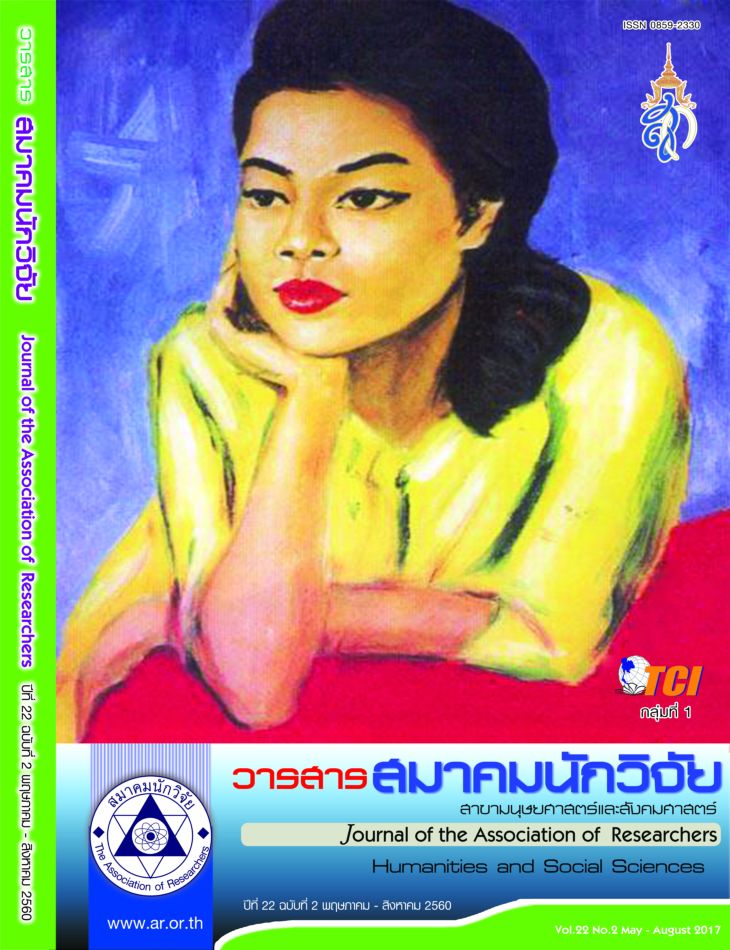The Influences of Leadership Participation Motivation and Educational Innovation on Successful Management of Basic Education School Board in Phuket Province
Main Article Content
Abstract
The purposes of this research were (1) to develop and validate a causal relationship model of successful management of basic education school boards in Phuket province with empirical data, and (2) to study the influences of leadership, participation, motivation, and educational innovation on successful management of basic education school boards in Phuket province. The sample was 400 basic education school boards who live in Phuket province and were selected by stratified random sampling. Research instrument was rating scale questionnaire with reliability index of categories between .894 – .913. The data were analyzed by structural equation modeling (SEM) technique. The results showed that 1) the causal relationship model of successful management of basic
education school boards in Phuket province was consistent with the empirical data, considering from fit index, namely χ2 = 313.465, df = 117, p-value = .000, Relative χ2 = 2.679, RMR = .011, RMSEA = .063, GFI = 0.936, AGFI = 0.915, NFI = 0.953, IFI= 0.970, CFI = 0.969. The variables in the proposed model accounted
for 48.7 percent of the total variance of successful management of basic education school boards. 2) The leadership, the participation, and the educational innovation had positive direct effects on the successful management of basic education school boards in Phuket province with a statistical significance
level at .05. However, the motivation had not significant effects on the successful management of basic education school boards in Phuket province.
Article Details
บทความที่ปรากฏในวารสารนี้ เป็นความรับผิดชอบของผู้เขียน ซึ่งสมาคมนักวิจัยไม่จำเป็นต้องเห็นด้วยเสมอไป การนำเสนอผลงานวิจัยและบทความในวารสารนี้ไปเผยแพร่สามารถกระทำได้ โดยระบุแหล่งอ้างอิงจาก "วารสารสมาคมนักวิจัย"
References
จันทนา แสนสุข. (2557). ปัจจัยที่เป็นเหตุและผลของความสามารถภาวะผู้นำ เชิงกลยุทธ์ของสถาบันอุดมศึกษาในประเทศไทย. วารสารสมาคมนักวิจัย. 19(1), 34-46.
ชัยนันท์ธรณ์ ขาวงาม. (2553). การพัฒนาการมีส่วนร่วมของประชาชนในการจัดการศึกษาขั้นพื้นฐาน กรณีจังหวัดลำพูน.ปรัชญาดุษฎีบัณฑิต สาขาวิชาบริหารศาสตร์ มหาวิทยาลัยแม่โจ้.
เดชณรงค์ วัฒนพันธุ์. (2551). ประสิทธิผลการบริหารจัดการของคณะกรรมการสถานศึกษาขั้นพื้นฐานในเขตภาคกลาง.ปรัชญาดุษฎีบัณฑิต สาขาวิชาการบริหารการศึกษา มหาวิทยาลัยเซนต์จอห์น.
โด่งสยาม โสมาภา. (2559). การวิเคราะห์ปัจจัยและแนวปฏิบัติที่เป็นเลิศในการบริหารจัดการสถานศึกษาเอกชนเพื่อรับรางวัลพระราชทาน. วารสารสมาคมนักวิจัย. 21(1), 101-121.
ตุลา มหาพสุธานนท์, (2555). หลักการจัดการ. (พิมพ์ครั้งที่ 2). กรุงเทพฯ : พีเอ็นเคแอนด์สกายพริ้นติ้งส์.
ธนเสฏฐ สุภากาศ, พร้อมพิไล บัวสุวรรณ, วิสุทธิ์ วิจิตรพัชราภรณ์ และนิศา ชูโต. (2557). การมีส่วนร่วมของชุมชนล้านนาในการบริหารสถานศึกษาขั้นพื้นฐาน:กรณีศึกษาชุมชนบ้านป่าก๋อย อำเภอเชียงแสน จังหวัดเชียงราย. วารสารเกษตรศาสตร์ (สังคม). 35(1), 45-60.
พรทิพย์ คําชาย และ สุดารัตน์ สารสว่าง. (2557). อิทธิพลของแบบภาวะผู้นําของผู้บริหาร ลักษณะส่วนบุคคล ลักษณ ะของงาน และ แรงจูงใจในการทํางาน ที่มีผลต่อเป้าหมายในการทํางานของอาจารย์มหาวิทยาลัยราชภัฏ. วารสารบริหารการศึกษา มศว (ฉบับพิเศษ) 1(3), 204-214.
วิโรจน์ สารรัตนะ. (2557). ภาวะผู้นำ: ทฤษฎีและนานาทัศนะร่วมสมัยปัจจุบัน.กรุงเทพมหานคร ทิพยวิสุทธิ์.
สำนักงานเขตพื้นที่การศึกษาประถมศึกษาภูเก็ต. (2558). กลุ่มนโยบายและแผน http://www.obec.go.th/
สมาคมกรรมการสถานศึกษาขั้นพื้นฐานแห่งประเทศไทย. (2555).กรรมการสถานศึกษาขั้นพื้นฐาน. (พิมพ์ครั้งที่ 2). กรุงเทพฯ:อักษรเจริญทัศน์.
อัมพร เรืองศรี และจันทร์ชลี มาพุทธ. (2553). การพัฒนารูปแบบการพัฒนาคุณลักษณะของนักเรียนตามแนวปรัชญาเศรษฐกิจพอเพียง. วารสารการศึกษาและการพัฒนาสังคม มหาวิทยาลัยบูรพา. 6 (2), 91-103.
อุทัย บุญประเสริฐ. (2552). การบริหารแบบฐานโรงเรียน. วารสารการบริหารการศึกษา มหาวิทยาลัยบูรพา 4(1), 1-10
Reference
Booprasert, U-thai. (2009). School-Based Management. Burapha University Journal. 4(1),1-10 (in Thai).
Cohen, J.M. , & Uphooff, N.T. (1977). Rural development participation : concepts and measures for project design, implementation, and evaluation. Ithaca, N.Y. : Rural Development Committee, Center for International Studies, Cornell University.
David, K. and Newstrom, W. (1989). Human Behavior at Work. (8thed.). New York: Mcgraw - Hill.
Galyon, C. E., Heaton, E. C. T., Best, T. L, & Williams, R. L. (2015). Comparison of group cohesion, class participation, and exam performance. Social Psychology of Education, September, 1-16.
Jacobs, T. O, and Jaques, E. (1990). Military executive leadership. In KE Clark & MB Clark. (Eds.), Measures of leadership, West Orange, NJ: 281-295
Khamchai, Pornthip & Sarnswang, Sudarat. (2014). Influences of administrator’s leadership styles,personal traits, job characteristicsand work motivationon Rajabhat University instructors goal.SWU Educational Administration Journal (Special Issue) 1(3),204 - 214. (in Thai).
Khawngam, Chainanthorn.(2010). People Participation Development in Fundamental Education Management A Case Study of Lamphun Province. Doctor of Philosophy in Administrative Science. Maejo University. (in Thai).
Kline, R. B. (2005). Principles and Practice of Structural Equation Modeling. (2nded.). New York: Guilford.
Luthans. (1998). Organizational Behavior. (8thed.) Boston: Irwin McGraw-Hill.
Mahapasuthanon,Tula. (2012). Principles of Management. (2nded.) Bangkok : PNK&SKY Printing. (in Thai).
Maharjan, S. (2012). Association between Work Motivation and Job Satisfaction of College Teachers.Administrative and Management Review. 24(2)
McKeown, M. (2008). The Truth About Innovation. London, Prentice Hall.
Northouse, P. G. (2010). Leadership:Theoryand practice (5th ed.), Thousand Oaks, CA: Sage Publications.
Patipan, Kittikhan. (2012). A Structural Equation Model of Creative Leadership for Vocatianal College Administrators. Doctor of Philosophy in Education Administration Graduate School Khon Kaen University. (in Thai).
Phuket Primary Education Service Area Office. (2015). Division of Policy and Planning. (in Thai).http://www.phuketarea.go.th/
Robbins, DeCenzo & Coulter. (2015). Fundamentalsof Management:Essential Conceptsand Applications,(9thed.) Publisher: Pearson.
Robbins, S. P. (1996). Organizational Behavior: Concepts, Controversies, Applications. (7thed.) New Jersey:Prentice-Hall.
Robert F. Russell, A. Gregory Stone, (2002) "A review of servant leadership attributes: developing a practical model", Leadership & Organization Development. Journal, 23(3) 145 - 157.
Ruangsri, Amporn. & Mapudh, Chanchalee. (2010). The Model Development to Develop Students Characteristicson Sufficiency Economy Philosophy. Journal of Education and Social Development Burapha University. 6(2), 91-103. (in Thai).
Russell, R., & Stone, A. (2002). A review of servant leadership attributes: Developing a practical model. Leadership & Organization Development Journal, 23(3/4), 145-157.
Sansuck, Chantana. (2014). Antecedents and Consequence of Strategic Leadership Capabilities of Higher Education Institute in Thailand. Journal of the Association of Researchers. 19(1), 34-46. (in Thai).
Sarnrattana,Wirot. (2014). Leadership:Theoryand ContemporarySymposium. Bangkok: Thippisut. (in Thai).
Somapha. Doangsiam. (2014). Analysis of Administrative Factor and Best Practice for Private Schools Toward the Royal Award Requisition. Journal of the Association of Researchers. 21(1), 101-121. (in Thai).
Suphakat, Thanaset., Buawsuwan, Prompilai., Wichitputchraporn, Wisut., and Xuto, Nisa. (2014). Participation of a Lanna Communityinthe Administration of Basic Education: A Case Study of Ban Pakoi Community, ChiangSaen District, Chiang Rai Province. 35(1), 45-60. (in Thai).
The Association of Basic Education School Boards of Thailand. (2012). Basic Education School Boards.(2nded.) Bangkok: Aksorn Charoenthat Company Limited. (in Thai).
Watanapunt, Dejnarong. (2008). TheEffectivenessof the Administrative ModuleBasic EducationSchool Board in the Central Part of Thailand. Doctor of Philosophy Degree in Education Administration and Leadership, Saint John’s University. (in Thai).


